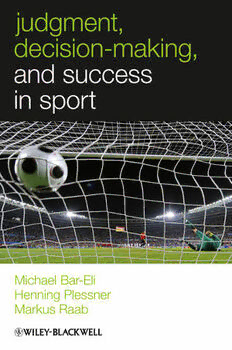
Judgement, Decision Making and Success in Sport PDF
Preview Judgement, Decision Making and Success in Sport
Judgement, Decision Making and Success in Sport Judgement, Decision Making and Success in Sport MichaelBar-Eli,HenningPlessnerandMarkusRaab Thiseditionfirstpublished2011 (cid:1)2011JohnWiley&SonsLtd. Wiley-BlackwellisanimprintofJohnWiley&Sons,formedbythemergerofWiley’sglobalScientific, TechnicalandMedicalbusinesswithBlackwellPublishing. RegisteredOffice JohnWiley&SonsLtd,TheAtrium,SouthernGate,Chichester,WestSussex,PO198SQ,UK EditorialOffices 350MainStreet,Malden,MA02148-5020,USA 9600GarsingtonRoad,Oxford,OX42DQ,UK TheAtrium,SouthernGate,Chichester,WestSussex,PO198SQ,UK Fordetailsofourglobaleditorialoffices,forcustomerservices,andforinformationabouthowtoapplyfor permissiontoreusethecopyrightmaterialinthisbookpleaseseeourwebsiteatwww.wiley.com/wiley- blackwell. TherightofMichaelBar-Eli,HenningPlessnerandMarkusRaabtobeidentifiedastheauthorsofthiswork hasbeenassertedinaccordancewiththeUKCopyright,DesignsandPatentsAct1988. Allrightsreserved.Nopartofthispublicationmaybereproduced,storedinaretrievalsystem,or transmitted,inanyformorbyanymeans,electronic,mechanical,photocopying,recordingorotherwise, exceptaspermittedbytheUKCopyright,DesignsandPatentsAct1988,withoutthepriorpermissionofthe publisher. Wileyalsopublishesitsbooksinavarietyofelectronicformats.Somecontentthatappearsinprintmaynot beavailableinelectronicbooks. Designationsusedbycompaniestodistinguishtheirproductsareoftenclaimedastrademarks.Allbrand namesandproductnamesusedinthisbookaretradenames,servicemarks,trademarksorregistered trademarksoftheirrespectiveowners.Thepublisherisnotassociatedwithanyproductorvendormentioned inthisbook.Thispublicationisdesignedtoprovideaccurateandauthoritativeinformationinregardtothe subjectmattercovered.Itissoldontheunderstandingthatthepublisherisnotengagedinrendering professionalservices.Ifprofessionaladviceorotherexpertassistanceisrequired,theservicesofa competentprofessionalshouldbesought. LibraryofCongressCataloging-in-PublicationData Bar-Eli,Michael. Judgement,decision-makingandsuccessinsport/MichaelBar-Eli,HenningPlessner,MarkusRaab. p.cm.– (W-Bseriesinsportandexercisepsychology;1) Includesbibliographicalreferencesandindex. ISBN978-0-470-69454-1(hardback)–ISBN978-0-470-69453-4(paper) 1. Sports–Psychologicalaspects. I.Plessner,Henning.II.Raab,Markus.III.Title. GV706.4.B3552011 796.01–dc22 2011009310 AcataloguerecordforthisbookisavailablefromtheBritishLibrary. Thisbookispublishedinthefollowingelectronicformats:ePDFs9781119977049;WileyOnlineLibrary 9781119977032;ePub9781119976936;eMobi9781119976943 Setin12/15ptTimesbyThomsonDigital,Noida,India 1 2011 Contents Preface vii Judgement and Decision Making as a Topic of Sport Science 1 Maximization and optimization in sport 3 JDM history 4 The development of JDM research in sport 6 Rationale and structure of this book 10 Theories of (Social) Judgement 13 Psychophysics 16 Social judgement theory 18 Social cognition 19 Summary 25 Theories of Decision Making 27 Subjective expected utility theory 31 Prospect theory 32 Decisional field theory 33 Simple heuristic approach 35 Summary 37 Expertise in JDM 39 What are the components of expertise in JDM? 42 How can we measure JDM expertise? 43 vi CONTENTS How can we explain JDM expertise? 46 How can we develop JDM expertise? 47 Summary 48 Athletes 51 Judging one’s own performance 53 What choices are athletes confronted with? 59 How do athletes choose? 66 JDM training for athletes 78 Summary 89 Managers and Coaches 91 JDM as a leadership task 93 Managerial JDM 95 Coaches’ JDM 108 Summary 121 Referees 123 The tasks of referees 126 Perceptual limitations 127 Prior knowledge 132 Rules of information integration 136 Improving referees’ JDM 139 Summary 143 Observers 145 Biases in judgements of sport performance 148 Predictions and betting 154 Summary 160 References 163 Author Index 189 Subject Index 201 Preface Itwasinlatesummer2007–afteragooddayofwindsurfing–whenwe cametogetherinanicerestaurantatFlensburgharbour.Herewefirstly elaborated on the idea of putting together a book on judgement and decision making in sport that comprises the entire up-to-date knowl- edgeofthisfield.Afieldallthreeofuslovetoresearch.Tobefair,we weremoreoptimisticaboutthetimescheduleofthisenterprise–none of us anticipated that it would take almost four years until we would finally hold the book in our hands. However, according to a recent theoretical approach to the evaluation offuture events,construal level theory(LibermanandTrope,2009),nobodywouldstartbigprojectsif he or she focuses on all the smaller or bigger hassles and efforts that immediately could get in his or her way (low level of construal). Instead, it is advisable to focus at least as much on the more abstract desirablegoalinthefardistance(highlevelofconstrual).Intheend,we are very happy that we did not loose track despite various difficulties that came up during this time, for example, one of us changed his job positiontwice,andareabletopresentalmostexactlythebookthatwe hadinmindwhenwemetinFlensburg.Wehopethatitopensthedoor for many readers to currently one of the most interesting and growing research fields within sport psychology and that they will share our enthusiasm about its development. Thebookhasbenefitedfromthehelpofmanycolleagues,whoeither contributeddirectlytothequalityofoneormorechaptersorsharedand discussed their ideas with us about judgement and decision making in sport on a moregeneral level. Thus, manythanks go to Ralf Brand, viii PREFACE VeraBr€ummer,WolfgangEngel,GeorgFroese,ThomasHaar,Thomas Heinen,TanjaHohmann,PhilippKaß,SonjaKishinami,J€ornK€oppen, Babett Lobinger, Clare MacMahon, Anne Milek, Alexandra Pizzera, Kirsten P€oschl, Rita de Oliveira, Geoffrey Schweizer, Christian Unkelbach, Kostas Velentzas, Pia Vinken, Karsten Werner, as well as to the performance psychology group at the Institute of Psychology at the German Sport University in Cologne and the students of the ‘JudgementandDecisionMakinginSport’seminarattheUniversityof Leipzig. Wealsothank Corbis andShutterstock for allowingustouse their images at the beginning of each chapter. Finally, special thanks go to Karen Shield from Wiley who was of great support and never lost her passion with us. Onapersonallevel,MikilikestodedicatethisbooktohissonAsaph, with deepest love, Henning likes to thank Birgit for her love and support, and Markus likes to thank his wife Marei and his children Lukas, Mia, Emily, Bo and Leo for all their love. Beer-Sheva, Heidelberg, K€oln, January 2011 Miki, Henning and Markus Judgement and Decision Making as a Topic of Sport Science 1 Judgement and Decision Making as a Topic of Sport Science MAXIMIZATION AND OPTIMIZATION IN SPORT Judgementanddecisionmaking(JDM)playamajorroleinsport-related activities,withtheadequacyofJDMprocessesbeingdirectlyrelatedto success or failure in sport. For example, athletes have to continuously decidebetweenalternativewaysofactingduringcompetition,andthey must choose between means of performance enhancement which are eitherpermittedorprohibited;coachesselectplayersfortheirteamsand decide on different training programmes and competition strategies; managers make investment decisions, dismiss unsuccessful coaches andevaluatecompetitors’success orfailure;referees categorizegame situations as being in line with the rules or not; journalists evaluate current performances andpredict the outcome offuture sport events – predictionswhichcanbeofmajorsignificancetospectatorsandfanswho participate in thegrowing marketof sport betting. The basic metaphor often underlying these examples is that of a machine. In a classic book published almost two decades ago, Hoberman (1992) even conceived athletes in our society as ‘mortal Judgement,DecisionMakingandSuccessinSport,FirstEdition. M.Bar-Eli,H.PlessnerandM.Raab. (cid:1)2011JohnWiley&Sons,Ltd.Published2011byJohnWiley&Sons,Ltd. 4 JUDGEMENT,DECISIONMAKINGANDSUCCESSINSPORT engines’,whichreflectthecreationof‘men-machines’whoattemptby allmeanstoexceedthenormallimitsofspeedandstrength.Dissecting the modern Western sport establishments, Hoberman demonstrated how human science and industrial technology have transformed and dehumanized sport, with the emphasis placed on training and devel- opment, drug therapies and psychological research. In a more recent publication,Bar-Eli,Lowengartetal.(2006)referredtothismachine- likemetaphor,labellingitsunderlyingprinciple‘maximizationthrough optimization’.Theyarguedthatbecausetheultimategoalofathletesin elite sport is the maximization of their performance, this pursuit of success and excellence requires them to optimize everything – be it a movement, an arousal state or a decision to be made. JDM HISTORY ThestudyofJDMcanbetracedbacktothelate1940s,evidencedmainly bythreemajor,quiteindependentapproaches:thedecision-andgame- theoretical,thepsychologicalandthesocial-psychological/sociological approaches.Ithasbeengenerallyassumedthat,ifindividualsareinvolved in JDM, when engaged in choosing from among several alternative coursesofactionandifthereisanunderstandingofhowJDMprocesses work–betheyrelatedtospontaneousordeliberativedecisionsandifthey aremadeunderconditionsofcertainty,risk,oruncertainty(Marchand Simon, 1958; Simon, 1960) – it can increase the efficiency and effec- tiveness of the decisions. JDM has been studied since the 1940s by researchers from many disciplines. These scholars were especially attuned to the distinctive yet interrelated facets of the normative anddescriptivecharacterizationsoftheJDMprocess(Over,2004)with theimplicitand/orexplicitpurposeofimprovingtheiroutcome.Inthis sense, such an approach reflected the abovementioned ‘maximization throughoptimization’principle(Bar-Eli,Lowengartetal.,2006). StandardnormativeJDMtheoriesarebasedonpostulatesthatenable one’soptimalgainmaximizationandlossminimization(Baron,2004). Despite the fact that the term ‘rationality’ has more than twenty
